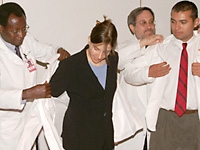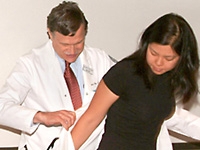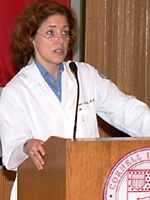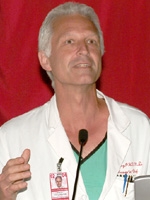
Drs. Estomih Mtui and Paul Miskovitz help Maria Master and Nathaniel Martinez with their white coats.
One hundred and three members of the first-year class (Class of 2007) donned their new, crisp, white coats with the help of faculty during the White Coat Ceremony, held Aug. 20 in Uris Auditorium. Dr. Phyllis August, professor of medicine and director of the hypertension program in the Division of Nephrology at Weill Cornell and director of the Lang Center for Research and Education at NewYork Hospital Medical Center of Queens, was the keynote speaker. Dean Antonio Gotto and Dr. Bruce Ballard greeted the new students at the seventh annual ceremony, which preceded Opening Exercises. (White coats are a gift of the Parents and Significant Others Committee.)
Dr. August, who is also professor of public health and associate professor of medicine in obstetrics and gynecology at Weill Cornell, spoke to students about the importance of having certain values in their lives, including gratitude, humility, compassion and growth. Following are a few excerpts from her speech:
"You will experience the true breadth of human existence from birth to death and everything in between. There will be joy, and pain, and every other conceivable emotion. In sharing these experiences with your patients, if you treat them with kindness and compassion, you will achieve a unique intimacy with them. Although to some extent it will be 'one-sided,' your patients will value it and be grateful for it.
"It has often been said that medicine sometimes cures, often relieves, and always consoles. We will not cure many of our patients; hopefully, we will not make them worse. But we can always make their suffering more bearable by being compassionate. This means listening to them, taking them seriously, answering their questions, and communicating to them that you are genuinely trying to help. This may not be easy all the time, especially when the clinical problem is challenging. But remember, most of the time the patient, not you, is the one who is sick, and we are in the fortunate position to provide guidance and comfort.

Dr. Oliver Fein helps Judy Choi with her white coat.
"As a doctor, you have an incredible opportunity to learn and grow both scientifically and technically as well as emotionally and spiritually. The opportunities for intellectual growth are unlimited. Your medical education is beginning today, and it will not end until you die. It takes more than intelligence, humility and compassion to be an effective physician; it takes a tremendous amount of strength. You will be asked to provide guidance in situations that are complex, emotionally challenging, and maybe even beyond your abilities. To be able to fill that role is not easy, and takes some experience. You will have the opportunity to grow, mature and become the strong, supportive, intelligent and wise physician—not overnight, but with time. And the process never ends: even after 30 years in the profession, I feel I am learning every day, both about the science of medicine as well as about how to be kinder, more compassionate, and more effective. I believe that continued, ongoing growth makes you a better doctor, and a better person."

Dr. Phyllis August, keynote speaker for the White Coat Ceremony.
Following Dr. August's presentation, Dean Gotto recited the Hippocratic Oath, which the students will affirm upon their graduation from Weill Cornell in 2007.
At the Opening Exercises following the White Coat Ceremony, the keynote address was presented by Dr. Philip Stieg, professor of neurological surgery and chairman of the Department of Neurological Surgery. Dr. Stieg talked about the honor of being a part of the Medical College and Hospital environment, and the importance of being a mentor and a leader.
He urged students to "achieve a state of mind that includes tolerance and submission to the pain and suffering that's involved with being in medical school and completing a residency, and try to figure out how to approach it in a positive way.

Dr. Philip Stieg, keynote speaker for Opening Exercises.
"In order to be a good mentor, one has to have some leadership qualities. Mentoring is one of those characteristics that you cannot bluff. There has to be substance. There has to be some style to it. A mentor is someone who should hold a mirror to you. You don't have your best friend as a mentor. And, as you mature and become young doctors, you will assimilate more responsibility, become more self-reliant, and hopefully, we will be able to cut the umbilical cord from mentoring.
"In the end, I think that each of your lives will be dependent upon your commitment to excellence. The three tenets of the academic life are patient care, education and research. If you pursue excellence in each of these three areas, you will certainly become a mentor and you will become a leader in medicine. But beyond that, I think you will lead a fulfilled life as a physician, as a father, mother, coach or a teacher. This is a great day in your life."

